The Federal Trade Commission (FTC) grilled Meta CEO Mark Zuckerberg on Tuesday over dozens of emails and messages he exchanged with other executives in the lead up to the social media giant’s acquisitions of Instagram and WhatsApp.
Zuckerberg took the stand for a second day at trial, where the FTC is attempting to show that Meta bought Instagram and WhatsApp to eliminate competitors that could have threatened its alleged monopoly in the social networking space.
Daniel Matheson, the FTC’s lead attorney, presented the Meta CEO with email after email, pressing him to account for the company’s motivations behind its 2012 purchase of Instagram and 2014 purchase of WhatsApp.
In one 2012 exchange, David Ebersman, Meta’s former chief financial officer, asked Zuckerberg what he hoped to accomplish with the Instagram acquisition, offering up several options, including to “neutralize a potential competitor.”
Zuckerberg responded at the time, confirming it was one of the factors.
When Matheson asked the Meta CEO on Tuesday whether the “genuine reason that you purchased Instagram was they could be disruptive” to the company, Zuckerberg said Instagram “was better, so I thought it was better to buy them.”
The Meta CEO has largely framed the company’s decision to purchase Instagram as a strategic choice between building out their own app or buying an existing app.
Over the past two days of testimony, the FTC has sought to show that Meta was struggling to adapt to the shift from desktop to mobile in the early 2010s, while new apps like Instagram emerged on the scene.
As Instagram grew in popularity, Meta attempted to develop its own mobile photo app, called Facebook Camera.
However, Zuckerberg voiced doubts internally at the time, saying he was “worried we’re so far behind that we don’t even understand how far behind we are and that this is going to be a huge amount of work.”
After the acquisition, Zuckerberg expressed frustration with Facebook’s progress in an exchange with Sheryl Sandberg, Meta’s former chief operating officer. Sandberg is expected to testify later this week.
“Messenger isn’t beating WhatsApp. Instagram was growing so much faster than us that we had to buy them for $1 billion ... That’s not exactly killing it,” Zuckerberg wrote.
In 2012 and 2013, Meta executives began voicing concerns about the rise of mobile messaging apps, including WhatsApp. Zuckerberg described it as the “next biggest risk and consumer opportunity.”
“I have been thinking hard about this for the past couple of sleepless nights since I am really worried ... these guys are the real deal,” Javier Olivan, who currently serves as Meta’s chief operating officer, said about WhatsApp in 2013.
Meta purchased the messaging app the next year for $19 billion.
The social media company has argued that it improved upon both Instagram and WhatsApp after the respective acquisitions, rejecting the FTC’s suggestion that the firms could have developed independently.
However, more broadly, Meta contends it is not a monopolist, pointing to numerous other competitors, like TikTok, YouTube, iMessage and X, that the FTC excludes from its personal social networking market.
Zuckerberg reportedly sought to avoid the high-profile trial and his lengthy appearance on the stand in recent weeks, appealing to President Trump to reach a settlement.












